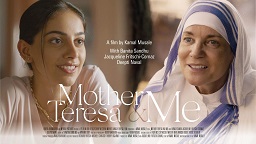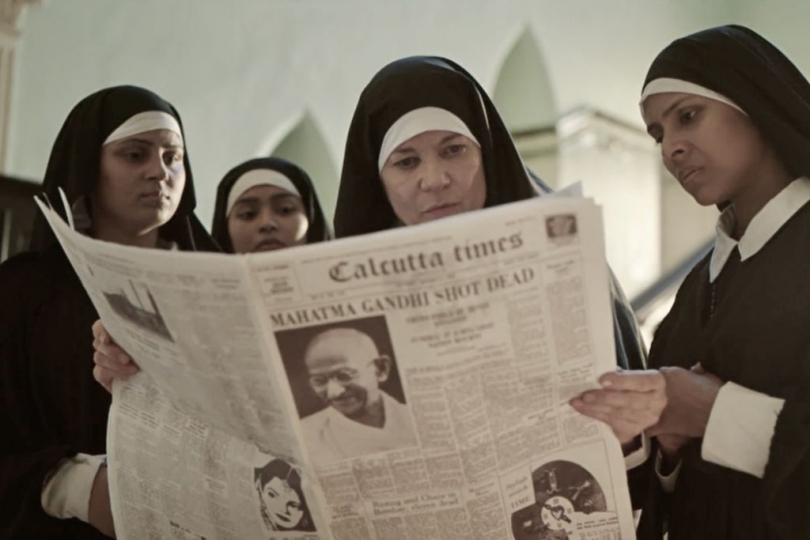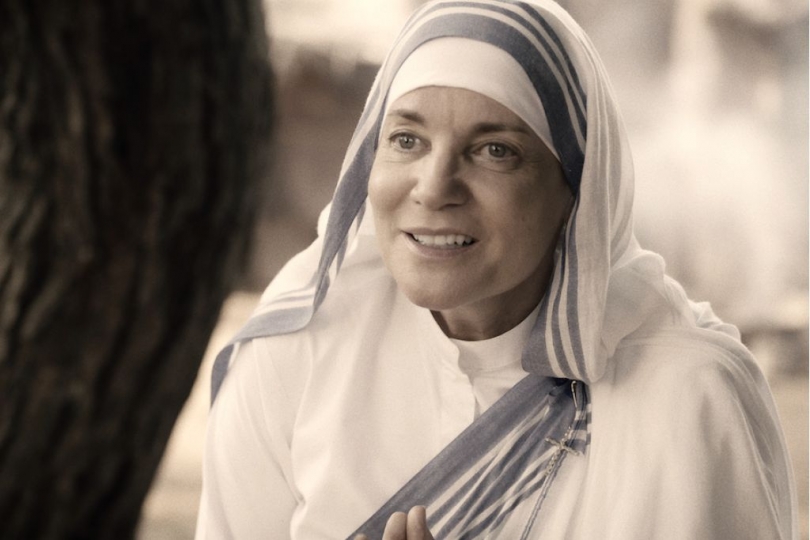|
|
||
|
Pro Tools
FILMFESTIVALS | 24/7 world wide coverageWelcome ! Enjoy the best of both worlds: Film & Festival News, exploring the best of the film festivals community. Launched in 1995, relentlessly connecting films to festivals, documenting and promoting festivals worldwide. We are currently working actively to upgrade this platform, sorry for the inconvenience. For collaboration, editorial contributions, or publicity, please send us an email here. User login |
Siraj SyedSiraj Syed is the India Correspondent for FilmFestivals.com and a member of FIPRESCI, the International Federation of Film Critics. He is a Film Festival Correspondent since 1976, Film-critic since 1969 and a Feature-writer since 1970. He is also an acting and dialogue coach. @SirajHSyed  Mother Teresa & Me: A stunning Swiss portrait of an Indian Saint
Mother Teresa & Me: A stunning Swiss portrait of an Indian Saint He comes across as a youngish, genial uncle, with a deadpan sense of humour. Answering to a name like Kamal Musale, he had to be at least part Indian. This Swiss-Indian film-maker’s Swiss company – Les Films du Lotus Sàrl – and his Indian company – Curry Western Productions Pvt Ltd – produce movies with Indian content, for western taste. Mother Teresa & Me transcends any such boundaries, for it is about an Albanian-Indian woman who chose to live in Kolkata, and changed the lives of thousands, for the better. The film encapsulates significant events in her life, running parallel with the life of a British-Indian woman, born shortly before Mother’s, and yet, touched deeply by her work and her legacy. It has been made with a lot of compassion and cinematic finesse. No matter what faith you follow, follow the lead to the nearest cinema where Mother Teresa & Me is running. Kavita is a professional violin player, living in London, with her Bengali parents. A spoiled modern young woman, for her, love is an illusion. She is having an affair with a British musician. Between an unsatisfying romantic relationship, the plans of her parents to wed her according to Indian tradition, and an unexpected pregnancy, which is accidentally discovered, Kavita is torn by inner conflicts. Her boy-friend wants her to abort the baby. But she is in two minds. Should she abort her baby or not? Unable to take the radical medical step, Kavita decides to return to her birthplace, Kolkata, in order to find solace in the arms of Deepali – her now very old nanny – who took care of her as a child. Deepali had herself been adopted as a child by Mother Teresa when she started working in the slums, in 1948. As Deepali narrates the stories of her past, Kavita starts to relive the beginnings of Teresa’s life in the slums of Calcutta (the earlier spelling of the city’s name). For the young Mother Teresa, her life dramatically changes when she hears the voice of Jesus on a train journey to Darjeeling: he orders her to go work for the poor in the slums. She doesn’t question this ordeal, as her love for Jesus and her compassion for the disabled and the poor mean everything. Following the call, she turns her back on her previous life as a nun, and devotes herself to the poor in the slums of Calcutta. But soon after creating her new order, the Missionaries of Charity, Teresa can’t hear the voice of her beloved Jesus anymore. She feels abandoned by her lover, her husband, her guide…She doubts the very existence of God. She loses faith. And yet, she continues to serve those who live in abject poverty. As Deepali leads her on a tour of discovery, she learns so much about Mother Teresa, and gathers strength to cope with her own life. Making an Indian film on Mother Teresa should not have been difficult, once permissions were obtained. But making an international film, with twin tales contrasting Kolkata of the twentieth century, with London and Kolkata of the new Millennium, is a tough ask. Mother Teresa was born Agnes Gonxhe Bojaxhiu in Uskup, Ottoman Empire (now Skopje, North Macedonia), on August 26, 1910. Her family was of Albanian descent. At the age of twelve, she felt strongly the call of God. She knew she had to be a missionary to spread the love of Christ. At the age of eighteen she left her parental home in Skopje and joined the Sisters of Loreto, an Irish community of nuns with missions in India. After a few months’ training in Dublin, she was sent to India, where on May 24, 1931, she took her initial vows as a nun. From 1931 to 1948 Mother Teresa taught at St. Mary’s High School in Calcutta, but the suffering and poverty she glimpsed outside the convent walls made such a deep impression on her that in 1948 she received permission from her superiors to leave the convent school and devote herself to working among the poorest of the poor in the slums of Calcutta. Although she had no funds, she depended on Divine Providence, and started an open-air school for slum children. Soon she was joined by voluntary helpers, and financial support was also forthcoming. This made it possible for her to extend the scope of her work. Mother Teresa’s work has been recognised and acclaimed throughout the world and she has received a number of awards and distinctions, including the Pope John XXIII Peace Prize (1971) and the Nehru Prize, for her promotion of international peace and understanding (1972). She died on 05 September 1997. (From Nobel Lectures, Peace 1971-1980, Editor-in-Charge Tore Frängsmyr, Editor Irwin Abrams, World Scientific Publishing Co., Singapore, 1997). Mother Teresa is one of the obvious twin tracks that writer-director Kamal Musale mounts his camera trolley on, and it is the more cinematic of the two. The other is Kavita’s life, a woman born in the 1990s, whose life gets tied to that of the Saint of Kolkata. Though well-executed, many strands of this thread are predictable, even when she decides to go to India after reading a tourist brochure that shows us the Kerala page. The twist in the tale, that she was rescued by Mother Teresa and then adopted by a Bengali family, is impressive, but when the Dalit (‘untouchable’ caste in Indian society) angle is brought in, one feels Musale is trying to do too much, having already spent considerable amount of footage on the issue of abortion. This is not to suggest that caste and abortion are major issues in society, particularly Indian Society. The end is a departure from the norm, yet it seems too simplistic, especially the dialogue. Kavita’s persistent visits to her boy-friend’s home and his avoiding her are overdone. If she was really desperate to meet him, she could have tried other means, like locating his friends and going to his place of work. Teresa’a mother appearing in her dreams is not a bad idea, but she merely utters just one-word every time she does: “Gonxhe”, which was her real name. The ease and thrust with which Mother Teresa gets things done appear quite incredible, though she might have actually possessed such a temperament. A very important plot point, her loss of faith, is not dealt in detail. Musale revealed that they had no authentic material to film this crisis in detail, the crisis being personal in nature.
Compliments are due for the way Musale captures the ambience of the slums and the Kolkata streets, including some rain. He let out his little secret himself when he revealed to the select audience that Kolkata was not shot in Kolkata but at a location north of Mumbai. He said that it would have been impossible to shoot in Kolkata, so it was recreated in Maharashtra. Bumbai Bird (90 min., fiction), a movie he shot in Hindi, was co-produced between his Indian and Swiss companies. It won the Best Indie Film at the European Cinematography Awards 2017, and the Best Screenplay at the Indian Cine Film Festival 2017. He co-directed Millions Can Walk (2014), with Christoph Schaub, a feature documentary about the Jan Satyagraha march, which saw 100,000 landless Indian farmers marching for their rights. The film has been distributed across cinemas in Europe, and won the Best Documentary Award at the Stuttgart Indian Film Festival, 2014. His recent movie, Curry Western (2018), a dark comedy about property, was shot in India and in the U.K. It won the Golden Remi for best feature film at the 52nd Annual WorldFest-Houston International Film Festival in Texas, USA and a Remi Special Jury Awards for best coproduction between Asia and Europe.
While looking for an actress to play Mother Teresa, Kamal leaned towards Switzerland. An actress and producer of Swiss origin with over thirty years of acting experience, Jacqueline Fritschi-Cornaz has appeared in theatre productions, television soaps, commercials and short films. She is multilingual and has had extensive training in method acting, dance and vocals. The confrontation with poverty during her first visit to India was shocking for Jacqueline. She initiated the Kavita and Teresa charity film, and is significantly involved in the movie’s development and fund-raising. Her make-up used to take three hours, and the results are for all to see. Jacqueline also worked on Albanian and Bengali accents, both being demands of the character. Her expressions, her gait, her dialogue delivery, all are high class. It is a tour de force.
‘Poetry’, or Kavita, comes to us via Banita Sandhu, a British actress. She was born and raised in South Wales, and is of Punjabi descent. Banita began acting as a child in local stage and film productions and she signed her first agent at just 11 years old. She began her professional acting career whilst attending King’s College London, in Shoojit Sircar’s Hindi feature film October (2018), alongside Varun Dhawan, followed by a Tamil remake of Arjun Reddy, titled Adithya Varma (2019, Pandora (2019) and Sardar Udham Singh (2020), co-starring Vicky Kaushal. In Mother Teresa and Me, Kavita changes gears from self-assured and spoilt, to confused and lost, to confident and in-charge, all quite easily. Banita learnt the violin for the part. The only really known Indian face in the cast is Deepti Naval, who plays Deepali. Her aging on screen is an issue, but there were never any doubts about her acting abilities. Incidentally, I was watching the film with Vinod Pande, who gave her the break in a film called Ek Baar Phir, many moons ago. National School of Drama alumnus Vikram Kochhar (Ghanchakkar, Trip to Bhangarh, Angry Indian Goddesses, Sumit Sambhal Lega, Hai Apna Dil Toh Awara, Manmarziyaan and Kesari) plays a sympathetic doctor, and speaks good English. Normally associated with comedy, he does a serious role with élan. Rating: *** ½ Trailer: https://youtu.be/mNG5eosGD6k 10.05.2023 | Siraj Syed's blog Cat. : Agnes Gonxhe Bojaxhiu Albanian Banita Sandhu Bengali Calcutta Curry Western dalit Deepti Naval Jacqueline Fritschi-Cornaz Kamal Musale Kolkata Millions Can Walk Vikram Kocchar Independent FILM
|
LinksThe Bulletin Board > The Bulletin Board Blog Following News Interview with EFM (Berlin) Director
Interview with IFTA Chairman (AFM)
Interview with Cannes Marche du Film Director
Filmfestivals.com dailies live coverage from > Live from India
Useful links for the indies: > Big files transfer
+ SUBSCRIBE to the weekly Newsletter DealsUser imagesAbout Siraj Syed Syed Siraj Syed Siraj (Siraj Associates) Siraj Syed is a film-critic since 1970 and a Former President of the Freelance Film Journalists' Combine of India.He is the India Correspondent of FilmFestivals.com and a member of FIPRESCI, the international Federation of Film Critics, Munich, GermanySiraj Syed has contributed over 1,015 articles on cinema, international film festivals, conventions, exhibitions, etc., most recently, at IFFI (Goa), MIFF (Mumbai), MFF/MAMI (Mumbai) and CommunicAsia (Singapore). He often edits film festival daily bulletins.He is also an actor and a dubbing artiste. Further, he has been teaching media, acting and dubbing at over 30 institutes in India and Singapore, since 1984.View my profile Send me a message The EditorUser contributions |






























